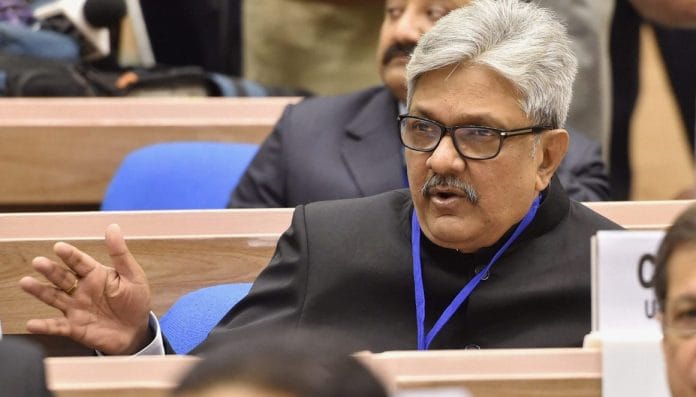It’s been two weeks since SC collegium reiterated the judge’s name, but a report says govt is unlikely to clear it while it approves two others.
New Delhi: Two weeks have already passed since the collegium reiterated its recommendation to appoint Uttarakhand High Court Chief Justice K.M. Joseph as judge of the Supreme Court, but the Narendra Modi government is yet to make a move.
On 20 July, the new collegium that was reconstituted after Justice J. Chelameswar’s retirement sent two other names — Madras High Court Chief Justice Indira Banerjee and Odisha High Court Chief Justice Vineet Saran — along with Joseph’s to the government to appoint them as top court judges.
The last time a collegium recommendation had to be reiterated was in 2012, and the then UPA government had taken less than 4 days to issue warrants of appointment.
In 2012, then collegium led by former CJI Altamas Kabir had reiterated the names of three judges on 17 December, just a day after the law ministry returned the files to the collegium. Five days later, the three judges — justices M.Y. Eqbal, V. Gopala Gowda and Vikramjit Sen — were sworn in by the President.
Also read: Modi govt sitting on CJI’s move to impeach Allahabad HC judge over MCI scam since January
Justice Joseph’s name was forwarded by the Supreme Court to the government on 10 January this year but it rejected his candidature, calling it “inappropriate” and “not fair and justified to other more senior, suitable and deserving chief justices”.
Many believe the government’s action is connected to Joseph’s March 2016 judgment, in which he overturned imposition of President’s Rule in Uttarakhand and reinstated the Congress government of Harish Rawat.
With reports suggesting that the government will further delay acting on Joseph’s appointment, the tussle between the executive and judiciary on judicial appointments is unlikely to be resolved anytime soon.
What the law says
Joseph’s appointment is inevitable since the ‘Third Judges case’ states that once the collegium reiterates its original recommendation, the government is bound by it and has to make the appointment as per convention. However, the government could simply delay it to frustrate the judiciary.
The Third Judges case is a 1998 case in which the apex court laid down comprehensive laws related to appointment of judges setting up the collegium system of appointing judges.
Meanwhile, the Centre for Public Interest Litigation (CPIL), a Delhi based non-profit has moved the top court against the Centre’s inaction on appointments.
Appearing for CPIL, advocate Prashant Bhushan called the central government’s decision to return Joseph’s recommendation in April an effort in “stonewalling of judicial appointments” for “oblique and vested interests”, as well as “interference in the due process of law and the independence and integrity of the judiciary.”
Options before the collegium
If the collegium’s recommendations are not honoured by the government in a time-bound manner, one option for the judiciary is to take up the case in court and issue judicial orders to the government.
Also read: Hitler wasn’t permanent & neither is this phase in Indian Supreme Court, says Jasti Chelameswar
The collegium, led by the chief justice of India who is the administrative head of the court, makes recommendations on appointments in its administrative capacity. A judicial order, however, makes it law of the land and the government can be held in contempt if it does not comply with the orders.
In 2016, former chief justice T.S. Thakur had admitted a PIL on judicial vacancies in high courts and issued a notice to the government. He had also summoned then attorney general Mukul Rohatgi asking him to explain in open court why the government had not cleared files sent to the ministry.







It could have been done on the previous occasion as well, when Justice Joseph’s name was kept in abeyance. However, if this is done a second time, in light of settled law, the Collegium might feel duty bound not to act upon a partial approval of a composite proposal, decide that the swearing in will be done after its recommendation is accepted in toto.